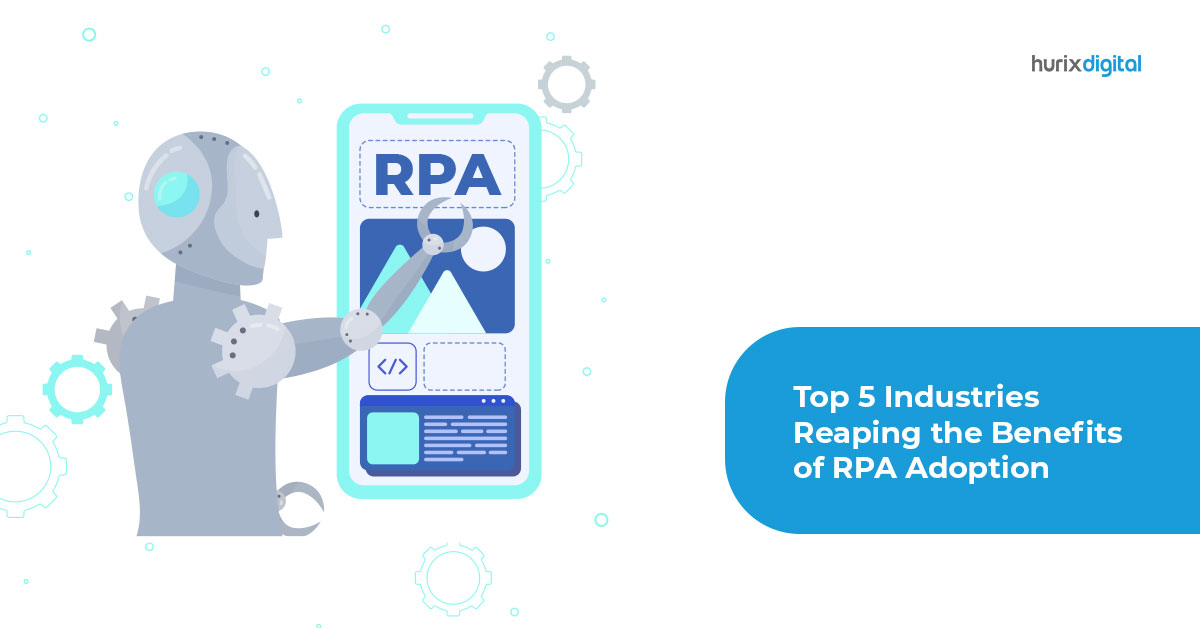Top 5 Industries Reaping the Benefits of RPA Adoption
We live in a highly digitally advanced world where everything from monotonous to high-tech demanding tasks can be automated. Process automation has developed to exceptional levels of sophistication through various modern-day tools and technologies like artificial intelligence, machine learning, and much more.
According to a recent poll, nearly 74% of stakeholders reported that process automation could significantly impact the workforce and their productivity.
As a result, various industries across the globe are adopting robotic process automation (RPA) to improve productivity and eliminate repetitive tasks from their workflow. Statistics predict an annual growth of 39.9% in the RPA industry from 2020 to 2030.
It is safe to say that the benefits of RPA are immense, and all industries, like the financial sector, hospitality sector, etc., are using it to their advantage.
Before we begin to discuss in more detail the industries benefitting from RPA adoption, let us first learn about robotic process automation. This will help you better understand how its functionalities align with the requirements of the industry/business.
Table of Contents
What Is RPA?
RPA, also known as robotic process automation, is advanced digital technology that allows organizations and businesses to automate repetitive and mundane tasks. The process automation system utilizes digital software called ‘bots’ to perform designated tasks.
The bots perform according to the instructions and interfaces specified for them. The objective of the automation system is to minimize human engagement in performing rule-based tasks.
The tasks which can be easily performed by RPA are:
- Data entry
- Data analysis
- Data verification
- Data reporting
- Document editing
- Document processing
- System Integration
- Invoice processing and billing
- Order processing
- Financial auditing
- Advertisement emailing
- Customer onboarding
- Customer care and support
- Payroll operation
Industries Utilizing Benefits of RPA
1. Healthcare Sector
Recently healthcare sector has also adopted business automation and witnessed several positive changes in the industry. By 2030, RPA in the healthcare industry is expected to grow into a $6.2 billion market.
The administrative process for healthcare providers is very time-consuming but very important to ensure the safety and security of the patients. RPA can automate various administrative tasks like patient registration, appointment scheduling, insurance claim verification, etc.
RPA can further enhance the functionality and productivity of electronic medical records (EMR) and electronic health records (EHR). It enables more accurate patient information management, which allows healthcare professionals to engage in a more robust decision-making process.
RPA can also automate medical record abstraction by reducing the probability of manual errors. Over time patient records accumulate at healthcare facilities, making it difficult for healthcare providers to retrieve information as and when required. With RPA bots, the abstraction can be made much easier, quicker, and more robust.
2. Banking and Finance
By adopting and implementing RPA, the banking and finance industry has reduced operational costs, improved customer experiences and support, enhanced operational efficiency, and much more. Many banks have now automated the tasks of account opening and onboarding through robotic process automation.
With a click of a few buttons, a customer can open a new account and get started. A variety of other tasks RPA can perform for the banking and finance industry are:
- Loan processing
- Report generation and analysis
- Data entry and analysis
- Document crosschecking
- Tax data management
- Cash management and operations
- Customer financial asset management
- Fraud detection and risk management
- Customer service training and support
Also Read: How RPAs are used for Business Automation?
3. Human Resources
The human resources department handles a huge amount of data, both from internal and external resources. It often becomes difficult for them to follow a streamlined data organization and analysis process.
Through RPA adoption, the HR department can automate all time-consuming and repetitive tasks and categorize them according to priority and relevance. RPA also allows HR managers and professionals to optimize their employee experience and help them to the best of their abilities.
Other tasks RPA can automate for the human resources department are:
- Employee onboarding and retention
- Data management and analysis
- Data reporting and verification
- Attendance and leave management
- Talent management
- Payroll processing
- Appraisal and finance management
- HR policy adherence and compliance
- Exit processing and offboarding
Also Read: What is Simulation in HRM? 5 Benefits of Using Simulation in HRM
4. Insurance Sector
Insurance industries function on a multi-step process and hierarchical workflows. With business process automation, each step can be enhanced for better efficiency and productivity.
For instance, the customer background check process can be fully automated to reduce the risk of personal biases and human error.
Numerous technologically advanced RPA bots can be engaged to explain the insurance policy to the customer in a way they prefer or is most comfortable with. RPA can enable the insurance industry to serve its customers in the most efficient and valuable manner.
5. Marketing And Sales
Lead generation and management are marketing and sales’ most important and challenging parts. By fully or partially automating this process, the marketing and sales department benefits greatly from it.
RPA can help you generate data singularly and collectively for each social media platform you want. It can also perform other activities related to lead generation, like lead scoring, lead assignment, lead following, and much more.
Some other tasks which RPA can automate for the marketing and sales industry are email campaign management, data entry and analysis, SEO marketing, order processing, invoice management, inventory management, customer service and support, web accessibility trends, and much more.
Conclusion
It is now safe to say that the benefits of RPA are immense. It can reduce your operational costs along with many other advantages, like bringing consistency to your workflow, improving analytics, enhancing employee productivity, enabling better IT support, etc. If you haven’t invested in RPA yet, now is the right time to do it.
However, it is also important to note that RPA has a learning curve. If you are now considering adopting RPA and looking for an automation company, you can contact us at Hurix Digital. We are one of the leading digital solutions platforms which numerous trusted customers globally. You can be our next customer and automate all your business needs with us to serve your customers.
Some other services we offer are digital content transformation, learning technology services, higher education services, and much more. You can contact our experts now and get started as soon as possible.

SVP & Head – Hurix Technology Solutions
Global Delivery head with 25 years of working experience in NYC investment banks and fintech companies. Hands-on technology delivery management and program management, accountable for stakeholder relationships, Strategic roadmap, P&L, Revenue growth, Account Management, and employee satisfaction.









